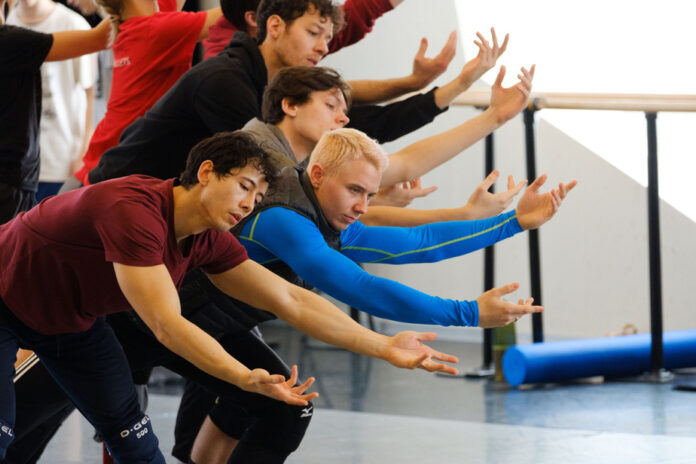We had to wait for it, hope for it, for months, for years. The Requiem, a work by American-Montreal choreographer Andrew Skeels, was to have its world premiere in February 2021 in Montreal, at Les Grands Ballets Canadiens. The pandemic decided otherwise.
Les Grands Ballets Canadiens made another attempt in February 2022, with no more success. Omicron then reigned supreme.
This time should be the right one: Les Grands Ballets Canadiens will present Requiem at Place des Arts this Thursday, March 23, until Sunday, March 26, before moving to the Center culturel de l’Université de Sherbrooke on March 28.
At the start of the creative work, in June 2020, very strict health protocols had to be respected.
“The dancers had to stay more than six feet apart and not touch each other. We all had to wear goggles and masks. Over time, we were able to add contacts. »
Only half of the cast present at the start of the project will be in the big premiere this week.
“There are so many people who worked on this creation in the very beginning who won’t get the chance to present it in front of an audience,” Skeels said. Dancers are nomadic creatures, they are constantly on the move in search of work, opportunities. »
Andrew Skeels chose the German Requiem, by Johannes Brahms, for his premiere. The German composer created this piece for choir and orchestra after the death of his friend and mentor, Robert Schumann, and his mother.
“At the start of the pandemic, in April 2020, I lost a very important friend, who was my mentor for 25 years,” says Andrew Skeels. It was a big shock. I needed a project that allows me to talk about the loss of someone, the mourning of a person who is very important to you. There was a connection there with Brahms, with the reason why he wrote this requiem. And it’s music that is absolutely beautiful. »
The choreography, resolutely contemporary, illustrates the pain of loss, but also the sweetness of memory.
“Contemporary dance appeals to me in part because you can draw inspiration from your deepest emotions,” says Skeels.
Nearly forty dancers bring his vision to life.
“It’s a real challenge to work with a large group, but the effect you get is very different. A move is amplified when 35 bodies perform it, that’s something you can’t get with a small set. A large group acts as a single organism. They are no longer just individuals, they are a real strength. »
Andrew Skeels will soon see another of his creations take shape in Montreal: he is the choreographer of the Cirque du Soleil show Echo.
“They’re not necessarily dancers, so you have to be able to see what’s going to make them shine on stage. So there is a lot of trial and error. »
There are also nice surprises, like this juggler from the National Circus School in Montreal who moves in an extraordinary way.
“It’s a natural talent, but it’s also a matter of training,” says Skeels. The school emphasizes a very broad, multidisciplinary approach. There is ballet in the curriculum, contemporary dance. When they leave school, they already have a lot of baggage. »
Andrew Skeels had done other projects with Cirque du Soleil, including the show Drawn to Life in Orlando and Joyà in Mexico. Echo will however be his first foray into the big top.















